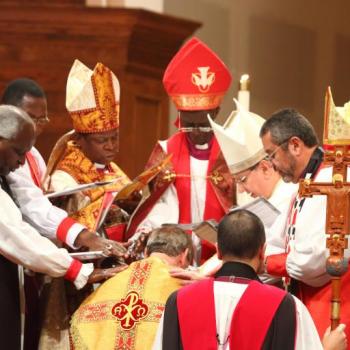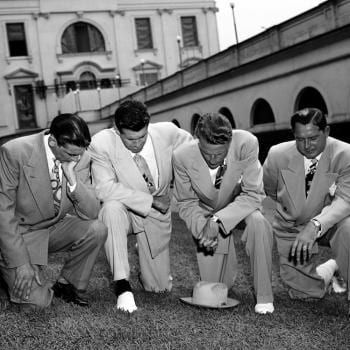Today is the anniversary of H. L. Mencken’s birth. Arguably, one of the greatest American writers, journalists, and editors of the first half of the twentieth century, the scion of Baltimore (1880-1956) never summoned up faith. But that did not stop him from paying attention to religion in all of its variety and actually paying it respect, in a poking fun sort of way. What New Atheist, for instance, would have the knowledge to make jokes at the expense of the Christian denominations and churches in all their variety? (What student who took my class on the history of religion in the United States, for that matter, could get the humor in Mencken’s observations when even the distinctions between evangelical and mainline Protestant don’t make sense?)
The God of the Episcopalians is an elderly British peer, courtly in manner, somewhat beefy, and, in New York, vaguely Jewish. The God of the Mormons shaves his upper lip, and believes in large families and a protective tariff; The God of the Methodists is an agent provocateur, forever fingering His pad of blank warrants. The God of the Baptists is amphibious, and in some of His aspects, almost identical with the Neptune of the Greeks. (64)
As some wit one said of Unitarianism, a movement typical of the modern effort to get rid of Hell, it is not a kind of Christinaity at all, but simply a mattress for skeptical ex-Christians to fall on. (112)
Today Protestantism is either a banal imitation of Catholicism or a cruel burlesque upon it. . . . In such regions bibliolotry turns upon and devours itself. Any half-wit, searching Holy Writ, is free to found a sect of his own – and if not upon the actual text, then upon the interpolations, mistranslations and typo-graphical errors. Thousands of such half-wits, as everyone knows, have made use of that franchise, and the result is chaos. The Roman church has escaped the same disaster by keeping the Bible in its place. What the Bible says, however it may clash with common knowledge and common sense, is inspired and infallible – but Holy Church reserves the right to determine precisely what it says. . . . (338)
Once a Frenchman announced to an American friend that he was leaving the church of his fathers. The American asked what variety of Protestantism he proposed to patronize. “I have lost my faith,” answered the Frenchman icily, “but not my reason.” (339)
The American form of Catholicism has not only embraced certain purely political ideas that are excessively obnoxious to Rome; it has also picked up no little Puritanism, which is to say, Calvinism. There are already Catholic Prohibitionists, though it must be added that they are still far from numerous; in the long run there may be Catholic revivalists, too, and even YMCA secretaries. (341-42)
These come from Mencken’s 1930 book, which he considered his most important, A Treatise on the Gods. In the preface Mencken described himself as a skeptic, neither a fanatic nor an atheist. “I am quite devoid of the religious impulse,” he wrote, “and have no belief in any of the current theologies. But neither have I any active antipathy to them. . . . no matter what may be said against them on evidential grounds, it must be manifest that they have conditioned the thinking of mankind since the infancy of the race.”












